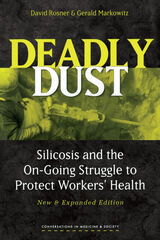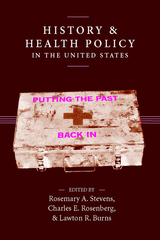2 books about Markowitz, Gerald

Deadly Dust
Silicosis and the On-Going Struggle to Protect Workers' Health
David Rosner and Gerald Markowitz
University of Michigan Press, 2006
During the Depression, silicosis, an industrial lung disease, emerged as a national social crisis. Experts estimated that hundreds of thousands of workers were at risk of disease, disability, and death by inhaling silica in mines, foundries, and quarries. By the 1950s, however, silicosis was nearly forgotten by the media and health professionals. Asking what makes a health threat a public issue, David Rosner and Gerald Markowitz examine how a culture defines disease and how disease itself is understood at different moments in history. They also explore the interlocking relationships of public health, labor, business, and government to discuss who should assume responsibility for occupational disease.
Back Cover
Back Cover
“If there is a paradigmatic tale of occupational health . . . Deadly Dust is it.”
—James L. Weeks, Science
“Rosner and Markowitz have produced a carefully crafted history of the rise and fall of this occupational disease, focusing especially on the political forces behind changing disease definitions. . . Deadly Dust comes as a fresh breeze into one of the more stuffy and too often ignored alleys of medical history.”
—Robert N. Proctor, The Journal of the American Medical Association
“A thought-provoking, densely referenced, uncompromising history. . . Like all good history, it challenges our basic assumptions about how the world is ordered and offers both factual information and a conceptual framework for rethinking what we ‘know’.”
—Rosemary K. Sokas, The New England Journal of Medicine
Back Cover continued
“Deadly Dust raises an important methodological problem that has long gone underarticulated in medical historical circles: how can social historians of medicine offer political or economic explanations for the scientific efforts of their professional subjects without losing a grip on the biological aspects of disease?”
—Christopher Sellers, The Journal of the History of Medicine
"A sophisticated understanding of how class and conflict shape social, economic, political, and intellectual change underlies this first attempt at a history of occupational health spanning the twentieth century."
—Claudia Clark, The Journal of American History%; FONT-FAMILY: Arial"
"This volume is well worth reading as a significant contribution to American social history."
—Charles O. Jackson, The American Historical Review
David Rosner is Distinguished Professor of History and Sociomedical Sciences, and Director of the Center for the History and Ethics of Public Health, Columbia University.
Gerald Markowitz is Professor of History at John Jay College of Criminal Justice of the City University of New York.
[more]

History and Health Policy in the United States
Putting the Past Back In
Stevens, Rosemary A
Rutgers University Press, 2006
In our rapidly advancing scientific and technological world, many take great pride and comfort in believing that we are on the threshold of new ways of thinking, living, and understanding ourselves. But despite dramatic discoveries that appear in every way to herald the future, legacies still carry great weight. Even in swiftly developing fields such as health and medicine, most systems and policies embody a sequence of earlier ideas and preexisting patterns.
In History and Health Policy in the United States, seventeen leading scholars of history, the history of medicine, bioethics, law, health policy, sociology, and organizational theory make the case for the usefulness of history in evaluating and formulating health policy today. In looking at issues as varied as the consumer economy, risk, and the plight of the uninsured, the contributors uncover the often unstated assumptions that shape the way we think about technology, the role of government, and contemporary medicine. They show how historical perspectives can help policymakers avoid the pitfalls of partisan, outdated, or merely fashionable approaches, as well as how knowledge of previous systems can offer alternatives when policy directions seem unclear.
Together, the essays argue that it is only by knowing where we have been that we can begin to understand health services today or speculate on policies for tomorrow.
In History and Health Policy in the United States, seventeen leading scholars of history, the history of medicine, bioethics, law, health policy, sociology, and organizational theory make the case for the usefulness of history in evaluating and formulating health policy today. In looking at issues as varied as the consumer economy, risk, and the plight of the uninsured, the contributors uncover the often unstated assumptions that shape the way we think about technology, the role of government, and contemporary medicine. They show how historical perspectives can help policymakers avoid the pitfalls of partisan, outdated, or merely fashionable approaches, as well as how knowledge of previous systems can offer alternatives when policy directions seem unclear.
Together, the essays argue that it is only by knowing where we have been that we can begin to understand health services today or speculate on policies for tomorrow.
[more]
READERS
Browse our collection.
PUBLISHERS
See BiblioVault's publisher services.
STUDENT SERVICES
Files for college accessibility offices.
UChicago Accessibility Resources
home | accessibility | search | about | contact us
BiblioVault ® 2001 - 2024
The University of Chicago Press









